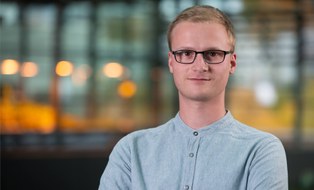Philipp Preußger // Visionen eines smarten Krieges? Bild und Ethik autonomer Waffensysteme
Inhaltsverzeichnis
Kontakt
 © M. Kretzschmar, TUD
© M. Kretzschmar, TUD
Kollegiat
NamePhilipp Preußger
Eine verschlüsselte E-Mail über das SecureMail-Portal versenden (nur für TUD-externe Personen).
Besuchsadresse:
Z21 Zellescher Weg 21
01217 Dresden
Büros: 3. Obergeschoss, Konferenzraum: Erdgeschoss
Postadresse:
Technische Universität Dresden Schaufler Lab@TU Dresden
01062 Dresden
Promotionsvorhaben: Visionen eines smarten Krieges? Bild und Ethik autonomer Waffensysteme
Fachgebiet: Evangelische Theologie
Betreuende: Prof. Dr. Christian Schwarke und Prof. Dr. Kerstin Schankweiler
Mit der Anwendung künstlicher Intelligenz in Waffensystemen wird die Ethik an einem zentralen Punkt herausgefordert: Indem autonome Technik ihr Ziel selbständig auswählen und angreifen kann, liegt die Entscheidung über Leben oder Tod eines Kombattanten nicht mehr allein beim Menschen. Die Verschiebung der Entscheidungskompetenz vom Menschen zur Maschine führt auch zu einer Verschiebung der Verantwortlichkeiten nicht nur in Bezug auf die Durchführung, sondern auch in Bezug auf die Planung und Auswertung der Handlung. In der gegenwärtigen Diskussion wird daher der Ruf laut, eine meaningful human control über alle Phasen einer Handlung zu etablieren.
Eine solche Forderung bringt einerseits das Gefühl der Ohnmacht des Menschen gegenüber der Maschine zum Ausdruck. Andererseits wird der Wunsch nach Kontrolle dann plausibel, wenn erkannt wird, dass nicht die konkrete Technik – diese ist angesichts der frühen Entwicklungsphase noch nicht greifbar –, sondern die Bilder der Technik der Ausgangspunkt einer ethischen Einschätzung sind.
Das Forschungsprojekt beleuchtet den Zusammenhang von Bild und ethischem Urteil am Beispiel der autonomen Militärtechnik. Dazu werden Bilder ausgewertet, die künstliche Intelligenz in ihrer militärischen Anwendung darstellen. Es zeigt sich, dass die Technik „humanoid“ abgebildet wird. Aufgrund dieser anthropomorphen Bilder werden ethische Fragen, die sich bisher allein auf den handelnden Menschen bezogen, auch an autonome Technik gestellt: Ist der Roboter verantwortlich? Wie weit darf seine Entscheidungsmacht gehen?
Solche Fragen implizieren eine Handlungskompetenz der Technik, die nur schwerlich behauptet werden kann. Wenn aber die Technik nicht „handelt“, dann kann ihre „Handlung“ auch nicht ethisch beurteilt werden. Dann muss das Davor und das Danach der Handlungsausführung in den Fokus der Ethik rücken: die Schnittstellen zwischen Mensch und Maschine.
Stand 11.3.2020
Curriculum Vitae
| seit 2020 | Wissenschaftliche Hilfskraft, Institut für Evangelische Theologie, TU Dresden |
| 2019-2020 | Wissenschaftlicher Mitarbeiter am Lehrstuhl für Systematische Theologie (ev.), Elternzeitvertretung, TU Dresden |
| 2014-2019 | Studentische Hilfskraft und Tutor am Lehrstuhl für Systematische Theologie (ev.) und am Bereich Geistes- und Sozialwissenschaften, TU Dresden |
| 2013-2019 | Studium des Höheren Lehramts an Gymnasien für die Fächer Deutsch und Evangelische Religion an der TU Dresden (Staatsexamen) |
